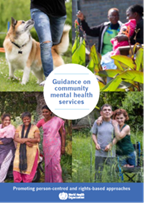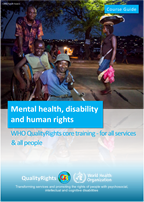Developing community-based mental health services
More than 215 million people are affected by mental health conditions in the Western Pacific Region. Depressive disorders are pervasive - responsible for 5.73% of the overall disease burden in the Region - yet underreported. Mental health conditions often affect and are affected by other diseases. Suicide is among the top 10 causes of death in some countries and areas.
WHO supports Member States in developing comprehensive, integrated and responsive mental health and social care services delivered through community platforms. Among the priority actions are determining the optimal mix of services, building capacity among non-specialist health workers to deliver essential mental health care, advocating for a recovery-oriented model of care, scaling-up low intensity psychological interventions, innovating through digital health, and integrating mental health into universal health coverage (UHC) and primary health care (PHC).
The mental health Gap Action Programme (mhGAP) is WHO’s flagship programme for mental health services to support scale-up care for priority mental, neurological and substance use disorders in non-specialized settings. Community workers and health care providers who are affiliated with primary, secondary and tertiary health care services can be trained in using scalable psychological interventions to bridge the gap in availability of evidence-based psychological services.









